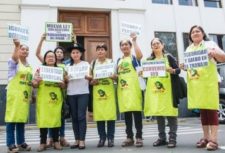Disclaimer: This article is more than 9 years old, and may not include the most up-to-date information or statistics. Please verify information with more recent sources as needed, and if you have any questions contact our Press Office.
17 March 2015
Government ‘complicit in slavery’ after voting to deny basic protections for overseas domestic workers say Anti-Slavery International.
The Government has been branded as being ‘complicit in slavery’ by Anti-Slavery International after MPs voted to take away the right for overseas domestic workers to change employers when in abusive situations. The charity said the vote ‘defies both common sense and basic decency’.
The MPs decided to vote against Lords’ amendment No 72 to the Modern Slavery Bill, which granted overseas domestic workers the right to change employers and escape forced labour if they were being abused.
Instead, the government pushed through their own amendment which introduced a requirement that before domestic worker can change employment they must first receive “conclusive grounds” decision from the National Referral Mechanism (NRM) that they have indeed been a victim of trafficking.
Anti-Slavery International director Dr Aidan McQuade has called this requirement, “a bureaucratic impediment to justice that masquerades as a commitment to investigation” and called the amendment “potentially unlawful”.
The requirement on an abused domestic worker to enter the NRM in order to be able to change employer puts the worker at risk of reprisals if they are seen to engage with the authorities.
Furthermore, the research has shown the NRM to be a flawed system, with victims from outside of the EU, which applies to the majority of overseas domestic workers, are over four times less likely to be positively recognised as being trafficked than those from within the EU.
Although the Government insists that their amendment is necessary to increase the detection and conviction rates for employers enslaving vulnerable workers, so far out of 29 cases referred by the NGO Kalayaan to the NRM which received “conclusive grounds”, only one has resulted in a conviction.
A legal Opinion commissioned by Anti-Slavery found that the Government’s amendment to the Modern Slavery Bill arguably constitutes unlawful discrimination.
The paper authored by our standing counsel Ms Parosha Chandran said: “[As] Victims of trafficking and slavery are victims of crime and all victims are entitled to both seek and obtain equal treatment before the law. There can be no lawful imposition on any victim of crime in the UK to require them first to be formally identified as being a victim under a Government scheme before being allowed to lawfully flee their abuser.”
Dr Aidan McQuade, the director of Anti-Slavery International, said:
“The Government has failed in its ambition of becoming a world leader in the struggle against slavery by their short sightedness on this issue. This amendment defies both common sense and basic decency.
“The Government has failed to have the enslavement of some of the most vulnerable women in the UK investigated up until now and is now using this very failure as an excuse to prolong their servitude.
“It has announced a review of this visa system to report after the elections, the third instigated by them on this matter. Wilberforce didn’t need that many to know that the Transatlantic Slave Trade was wrong.”
Note to Editors:
For more information and to arrange interviews please contact Anti-Slavery International Press Officer Jakub Sobik on 07789 936 383 or at j.sobik@antislavery.org; or director of Anti-Slavery International dr Aidan McQuade on a.mcquade@antislavery.org or mobile 07816951088.





